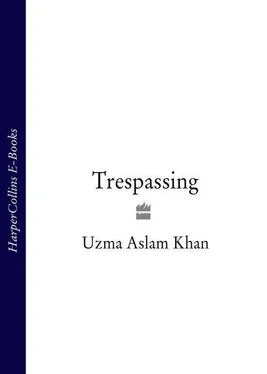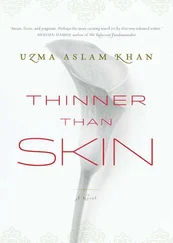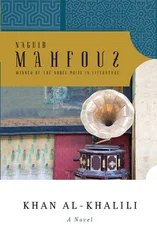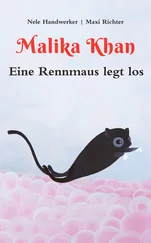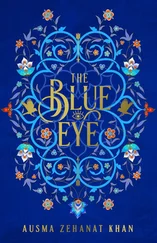On the roof, the rain continued to pound. Once, it had been sweet music to her ears. Now only the telephone was. It hadn’t rung for her today. Possibly, Anu was swamping Daanish. Bitterly, Dia remembered how she herself had warned Nini: the woman was recently widowed and had only one child, that too a son.
Riffat too was a widow. She too had suffered, and Dia did not ever want to be the cause of more suffering. As her mother’s sweet, sleepy chit-chat blew in the dark rooms Dia’s stomach clenched. Both she and Daanish betrayed their mothers.
She wondered if, like her, this bothered Daanish more because his father was dead. And whether he’d give anything, even his time with Dia, to have him back again. Just once. Would she?
Riffat said, ‘I’m hungry.’
‘Well,’ replied Hassan, ‘we can always avail ourselves of the scrumptious food in the refrigerator. The functioning refrigerator.’
Dia exhaled loudly, enough to let him know he was a pompous beast.
‘It’s sort of like sleeping over at the farm,’ Riffat continued. ‘We could have a picnic. Sandwiches and lemonade …’
‘Warm lemonade,’ Hassan interjected.
‘… It’s been so long since we had a picnic.’
‘Eating in the house you’ve lived in all your life,’ declared Dia, ‘isn’t exactly a picnic. Lights or no lights.’
Inam Gul drifted by again, still spooked. The soles of his rubber slippers squeaked and he spun around, spooking himself. He tried to settle quietly beside Dia on the damp rug but quickly jerked up again, ready for battle.
Dia clicked her tongue once more. ‘What’s the matter with you, Inam Gul?’
‘What irks you, darling?’ Riffat called from inside her room. ‘You’ve been rather sullen lately. Is it still Nini?’
Dia blinked back tears. She rose, took a candle from the shelf, and without answering, walked into the dining room. She stared at the telephone, the one that had transmitted her first conversation with Nini about Daanish. She moved quickly to the bathroom and locked herself in.
Setting the candle down near the soap dish on the sink, Dia unhooked her shalwar. She didn’t really need to go — these days most of it was sweated out. But she lingered on the toilet seat, glad for a quiet moment alone. The yellow tiles of the wall were dotted with moisture, and a tiny mushroom spore was beginning to form. It held her attention for several minutes before she forced herself back out.
In the kitchen, Inam Gul was squeezing two lemons while Riffat opened a tin of cheese. She sliced and arranged it between pieces of bread. Hassan had already begun on a sandwich. Between great mouthfuls, he reported how dry they were. Then his chatter turned to politics, over which he and Riffat always disagreed.
There was talk that the President would depose the Prime Minister again. ‘The army should do it,’ he proclaimed. ‘It should just take over.’ Inam Gul handed him lemonade.
Riffat, her back to him, said, ‘Will we ever have a civilian government for more than two years? Generals and presidents have to let elected leaders run their course.’
‘You can hardly call them leaders,’ he chewed. ‘And who knows if they were really elected.’
‘Ditto for the generals.’
‘They might bring more peace at least. Fewer strikes and riots. God knows Karachi needs a break from that.’
‘Imposed peace is not peace. People will only simmer more.’
‘Simmer,’ Hassan nodded, ‘but at least not boil.’
‘If elected leaders could complete their term,’ Riffat insisted, ‘the anger would boil away.’
‘Eventually, maybe. But after how much more bloodshed?’
‘You forget,’ said Riffat testily, ‘the bloodshed began when a general ruled.’
Such references were the closest Riffat ever came to discussing her husband’s murder. Hassan understood this. So did Dia, standing in the darkened doorway.
‘That was,’ Riffat continued, ‘during the third military rule. How many more do we need to understand our mistakes?’
Hassan, though mouthy, was by temperament skittish. He shrugged, and attempted to get out of the question by teasing Riffat. ‘You just want to see our poor, martyred, “daughter of the east” back again, don’t you, Ama? You’re Sindhi to the core.’
Riffat, exasperated, answered, ‘I just want to leave politics to the politicians. God knows from whom you inherited your coup mentality!’ She sat down, adding, ‘There’s biscuits.’
Dia entered the kitchen.
‘There you are,’ Riffat looked up.
‘We’re having a gala time.’ Hassan champed on a second sandwich, speaking with moist cheese on his tongue. ‘I know someone who said you submitted your exam blank.’
‘Oh?’ Dia pulled out a chair. ‘Did that someone tell you she cheated?’
‘It was a he. And no, his sister did not tell him she cheated. Not all sisters do.’
She glared at him. ‘What’s that supposed to mean?’
‘You’re right, Ama. She’s very cranky lately.’
‘I didn’t say cranky,’ Riffat gently interceded. ‘I just think something’s bothering her.’
‘Do I have to be referred to in the third person when I’m at the same table?’
‘You see,’ Hassan nodded.
Inam Gul coughed in the dark. He ate alone in a corner, listening.
‘Well, the last time I addressed you,’ Riffat said, ‘you walked away. So I didn’t want to chase you out again.’ She watched closely while nibbling cheese.
Dia tried to eat.
Riffat pursued, ‘What happened at the exam? I saw you studying. Was it hard?’
Dia peeled off a slice of the bread. There was too much butter and Hassan smelled bad. ‘I just didn’t want to be there,’ she replied. ‘Everyone was making me feel ill.’
‘Oh, poor baby,’ cooed Hassan.
‘You didn’t have to focus on them.’ Riffat’s tone was neutral. Not accusing, but not sympathetic either.
‘I don’t want to talk about this.’ Dia stood up.
As she left the kitchen she heard Riffat call, ‘You’re going to have to some time, Dia. Because I want to know why a brilliant girl like you …’
She drifted back through the room where the telephone beckoned, hesitated, then wound around to the front door. Here her father’s portrait met her. The portrait she hated. The one that did not capture what she’d known of him: the soft jowls shaking with laughter as she read to him; the tattered, cotton banyaans and coconut oil; the heavy, ungainly walk in contrast to Riffat’s vixen trot; the tree-climber. Her fat, agile father was turned into a still life in a suit with a gilt frame holding him in, forcing those eyes to stare in horror at the future looming close.
Holding a candle up to his face, Dia peered, as she had so many times before, for something familiar. But the only thing that was common to both the person and the portrait was that she couldn’t see a trace of herself in it. Where did her large, amber eyes come from? The deep dip between her nose and upper lip? Dark complexion?
She blew out the candle and pressed deep into the portrait. In the dark, she could believe he was as he’d been when she’d read to him almost every night from her Book of World Fables. They carried pillows up the mulberry tree, a light (it had to be electric, dias were too flammable), and in the still, dry months, paper fans. While she read, he enjoyed the pictures. His breath smelled vaguely of brown sugar, and his arms of milk bread. She did not know it at the time but the crafty pages of the book were trapping his scents, blending them with their own old, ligneous sigh, so she was left less with the stories, and more with his vapor. She had to work hard to conjure up solid memories of him, but Dia felt her father everywhere.
Читать дальше
Конец ознакомительного отрывка
Купить книгу
